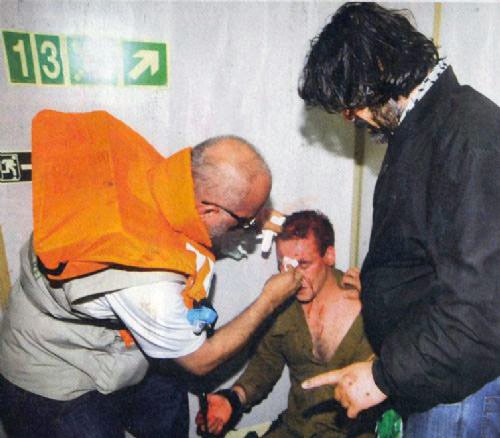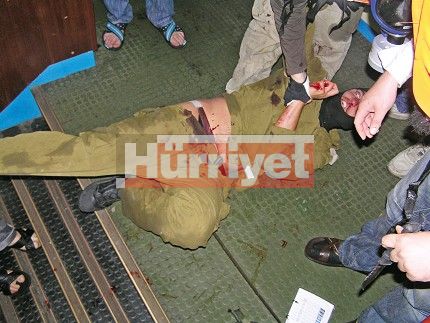Wednesday
Jun302010
Turkey Inside Line: Israel's Unmanned Planes, Iran's Uranium, Trouble with the EU, and More
 Wednesday, June 30, 2010 at 5:56
Wednesday, June 30, 2010 at 5:56
Turkish-Made Drones to Take Over from Israeli Herons?: Turkish sources stated that the design, detail production, and assembly of the Turkish MALE (Medium Altitude Long Endurance) Unmanned Aerial Vehicle have been completed and first test flights will be carried out done in the second half of 2010.
[youtube]http://www.youtube.com/watch?v=FRQtM6xzRDI[/youtube]
Director-General Muharrem Dortkasli said, "We can sell this vehicle for use by many friends and allies. That is our project."
Turkey's Call for Implementation of Iran's Nuclear Swap Deal: Turkey has called on Iran and Western powers to implement the nuclear fuel swap agreement, starting talks as soon as possible.
On Monday, responding to Iranian President Mahmoud Ahmadinejad’s remarks that Iran would not join discussions until late August, Turkish Foreign Ministry spokesman Burak Özügergin said:
Visa Requirements Lifted with Indonesia: On Tuesday, following a meeting between Turkish President Abdullah Gül and Indonesian President Susilo Bambangu Yudhoyono, agreement was reached to lift mutual visa requirements.
The approach on visas has been a major foreign policy strategy for the Erdogan Government. Requirements have been lifted with Syria, Pakistan, Albania, Jordan, Lebanon, Qatar, Russia, Iran, and other countries.
Turkey and Indonesia also signed eight agreements including cooperation between defense industries, cultural exchange programmes, and sea transportation . The two presidents agreed to increase the trade volume from the current $1.5 billion to $10 billion in the medium-term.
Turkey-EU Relations: Diplomatic sources expect the next chapter of European Union negotiations, focusing on food safety, veterinary safety, and phytosanitation, to be opened at an intergovernmental conference in Brussels on Wednesday.
There are 35 chapters that Turkey needs to fulfill to attain EU membership. Twelve have been opened, but 18 of the other 23 have been blocked, including eight relating to Ankara'ss failure to open its borders to EU member Cyprus.
Turkish Foreign Minister Spokesman Burak Özügergin said:
Turkey-Russia Competition: Following the G20 summit in Toronto over the weekend, Turkey and Russia have opened a competition to host the bloc’s 2013 meeting.
Arkady Dvorkovich, a consultant to Russian President Dmitry Medvedev, said :
[youtube]http://www.youtube.com/watch?v=FRQtM6xzRDI[/youtube]
Turkey Video Special: Prime Minister Erdogan’s 50 Minutes on US Television (29 June)
Director-General Muharrem Dortkasli said, "We can sell this vehicle for use by many friends and allies. That is our project."
Turkey's Call for Implementation of Iran's Nuclear Swap Deal: Turkey has called on Iran and Western powers to implement the nuclear fuel swap agreement, starting talks as soon as possible.
On Monday, responding to Iranian President Mahmoud Ahmadinejad’s remarks that Iran would not join discussions until late August, Turkish Foreign Ministry spokesman Burak Özügergin said:
If they do not sit down and talk, we will be in a worse-off situation this time next year. Time is working against a solution.
We would like this swap deal to be implemented and for negotiations to be held to resolve outstanding issues to secure a peaceful settlement to the dispute over Tehran's nuclear program.
Visa Requirements Lifted with Indonesia: On Tuesday, following a meeting between Turkish President Abdullah Gül and Indonesian President Susilo Bambangu Yudhoyono, agreement was reached to lift mutual visa requirements.
The approach on visas has been a major foreign policy strategy for the Erdogan Government. Requirements have been lifted with Syria, Pakistan, Albania, Jordan, Lebanon, Qatar, Russia, Iran, and other countries.
Turkey and Indonesia also signed eight agreements including cooperation between defense industries, cultural exchange programmes, and sea transportation . The two presidents agreed to increase the trade volume from the current $1.5 billion to $10 billion in the medium-term.
Turkey-EU Relations: Diplomatic sources expect the next chapter of European Union negotiations, focusing on food safety, veterinary safety, and phytosanitation, to be opened at an intergovernmental conference in Brussels on Wednesday.
There are 35 chapters that Turkey needs to fulfill to attain EU membership. Twelve have been opened, but 18 of the other 23 have been blocked, including eight relating to Ankara'ss failure to open its borders to EU member Cyprus.
Turkish Foreign Minister Spokesman Burak Özügergin said:
We expect consistency from the EU. You don’t open negotiation chapters but then say, [The] axis is shifted." The EU should be coherent.
There are 18 chapters which are blocked and we expect Belgium's rotating EU presidency to remove defects caused by the EU in the following period. The EU should consider where it wants to go with Turkey. Turkey recognizes EU membership as a strategic target.
Turkey-Russia Competition: Following the G20 summit in Toronto over the weekend, Turkey and Russia have opened a competition to host the bloc’s 2013 meeting.
Arkady Dvorkovich, a consultant to Russian President Dmitry Medvedev, said :
As all we know, the next summit in 2011 will be held in South Korea. The 2012 summit will be held in Mexico. Russia wants to host the 2013 gathering. On Sunday, the Russian government made its application. We know that Turkey has also already applied.
tagged  Abdullah Gul,
Abdullah Gul,  Albania,
Albania,  Arkady Dvorkovich,
Arkady Dvorkovich,  Burak Özügergin,
Burak Özügergin,  Canada,
Canada,  Cyprus,
Cyprus,  Dmitry Medvedev,
Dmitry Medvedev,  European Union,
European Union,  G20 Summit,
G20 Summit,  Heron,
Heron,  Indonesia,
Indonesia,  Iran,
Iran,  Israel,
Israel,  Jordan,
Jordan,  Lebanon,
Lebanon,  Mahmoud Ahmadinejad,
Mahmoud Ahmadinejad,  Mexico,
Mexico,  Pakistan,
Pakistan,  Qatar,
Qatar,  Recep Tayyip Erdogan,
Recep Tayyip Erdogan,  Russia,
Russia,  South Korea,
South Korea,  Susilo Bambangu Yudhoyono,
Susilo Bambangu Yudhoyono,  Syria,
Syria,  Turkey,
Turkey,  Turkish Armed Forces (TSK) in
Turkish Armed Forces (TSK) in  Middle East & Iran
Middle East & Iran
 Abdullah Gul,
Abdullah Gul,  Albania,
Albania,  Arkady Dvorkovich,
Arkady Dvorkovich,  Burak Özügergin,
Burak Özügergin,  Canada,
Canada,  Cyprus,
Cyprus,  Dmitry Medvedev,
Dmitry Medvedev,  European Union,
European Union,  G20 Summit,
G20 Summit,  Heron,
Heron,  Indonesia,
Indonesia,  Iran,
Iran,  Israel,
Israel,  Jordan,
Jordan,  Lebanon,
Lebanon,  Mahmoud Ahmadinejad,
Mahmoud Ahmadinejad,  Mexico,
Mexico,  Pakistan,
Pakistan,  Qatar,
Qatar,  Recep Tayyip Erdogan,
Recep Tayyip Erdogan,  Russia,
Russia,  South Korea,
South Korea,  Susilo Bambangu Yudhoyono,
Susilo Bambangu Yudhoyono,  Syria,
Syria,  Turkey,
Turkey,  Turkish Armed Forces (TSK) in
Turkish Armed Forces (TSK) in  Middle East & Iran
Middle East & Iran 



